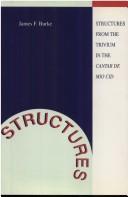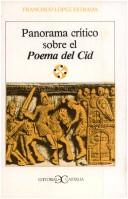| Listing 1 - 2 of 2 |
Sort by
|

ISBN: 0802059473 1282039857 9786612039850 1442680245 9781442680241 9780802059475 9781282039858 Year: 1991 Volume: vol 66 Publisher: Toronto Buffalo London University of Toronto Press
Abstract | Keywords | Export | Availability | Bookmark
 Loading...
Loading...Choose an application
- Reference Manager
- EndNote
- RefWorks (Direct export to RefWorks)
The medieval poem Cantar de Mio Cid is one of the great works of Spanish literature. Its precise date is uncertain, and its author has never been identified. Some scholars believe that it was written by many authors who, over time, adapted earlier material. In this study James Burke considers the authorship of the poem as revealed in key structural components. Placing the Cantar de Mio Cid more in the emerging culture of writing than in the sphere of oral poetry, Burke maintains that the text was produced in a manner typical for the Middle Ages by a writer who followed procedures very specific to the period.Medieval writers were invariably educated in the basic subjects of the trivium: grammatica, rhetorica, and dialectica, taught in the 'middle schools' of the twelfth century. In the process they acquired techniques that enabled them to rewrite pre-existing materials of an authoritative character, emphasizing themes and ideas important for contemporaries.Burke argues that someone rewrote epic material having to do with the Cid in this way. Referring to a device described by the twelfth-century Spanish philosopher Dominicus Gundissalinus as 'the imaginative, poetic syllogism,' Burke identifies three instances of the device in the Cantar de Mio Cid. They support themes and motifs of awakening, manifestation, and revelation, and of the hero as exemplar.This volume sheds new light on a central work in Spanish literature and on medieval poetry in general.
Literature, Medieval --- Poetics --- Themes, motives. --- History --- Cantar de mio Cid. --- Cantar de mio cid. --- Bivar Rodrigo, Díaz de, --- Campeador, --- Cid Campeador, --- De Vivar, Rodrigo Díaz, --- Díaz de Bibar, Rodrigo, --- Díaz de Vivar, Rodrigo, --- Díaz de Vivar, Ruy, --- Díaz, Rodrigo, --- El Cid, --- Vivar, Rodrigo Díaz de, --- Edición compuesta de la transcripción moderna en verso-romance del Cantar de mío Cid --- Poema del Cid --- Poema de mío Cid --- Poem of the Cid --- Cid, --- Romances --- History and criticism. --- Cid (Epic cycle) --- Cantar de mío Cid. --- Cantar de mio Cid --- Rodericus, --- Rodrigo Díaz,

ISBN: 8470394002 9788470394003 Year: 1982 Volume: 30 Publisher: Madrid: Castalia,
Abstract | Keywords | Export | Availability | Bookmark
 Loading...
Loading...Choose an application
- Reference Manager
- EndNote
- RefWorks (Direct export to RefWorks)
860 "11" POEMA DEL CID --- 860 "11" POEMA DEL CID Spaanse literatuur--?"11"--POEMA DEL CID --- Spaanse literatuur--?"11"--POEMA DEL CID --- Cid --- -Corman, Sidney --- Romances --- -History and criticism --- Cid, --- Bivar Rodrigo, Díaz de, --- Campeador, --- Cid Campeador, --- De Vivar, Rodrigo Díaz, --- Díaz de Bibar, Rodrigo, --- Díaz de Vivar, Rodrigo, --- Díaz de Vivar, Ruy, --- Díaz, Rodrigo, --- El Cid, --- Vivar, Rodrigo Díaz de, --- History and criticism. --- History and criticism --- Cantar de mio Cid. (Mélanges) --- Cantar de mio Cid. (Versch. onderwerpen) --- Rodericus, --- Rodrigo Díaz, --- Cid, - approximately 1043-1099 - Romances - History and criticism --- Cid, - approximately 1043-1099
| Listing 1 - 2 of 2 |
Sort by
|

 Search
Search Feedback
Feedback About UniCat
About UniCat  Help
Help News
News